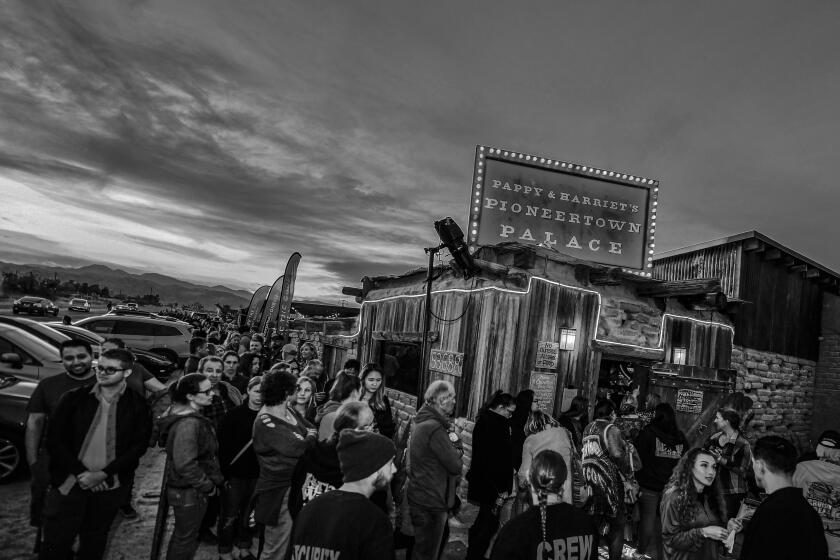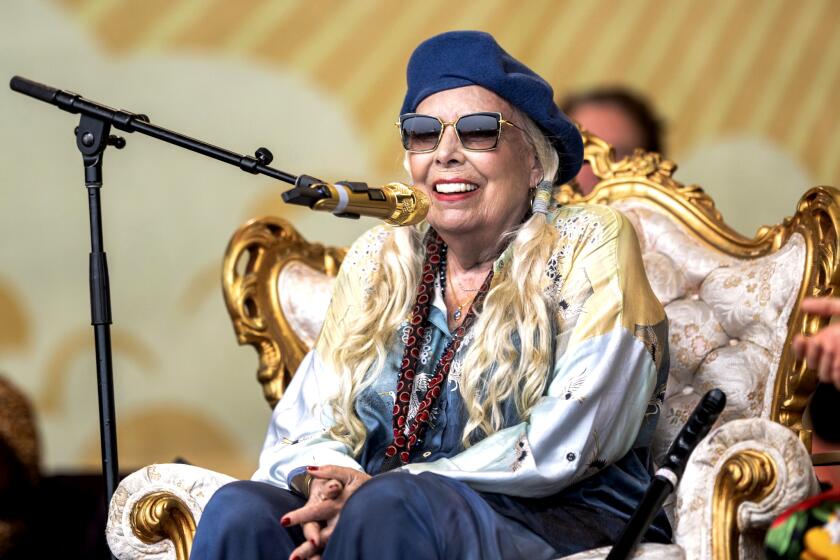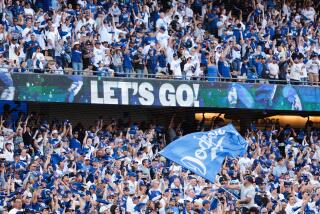$5,000 freeze-out: Bruce Springsteen fans feel betrayed by ‘crazed’ concert ticket prices
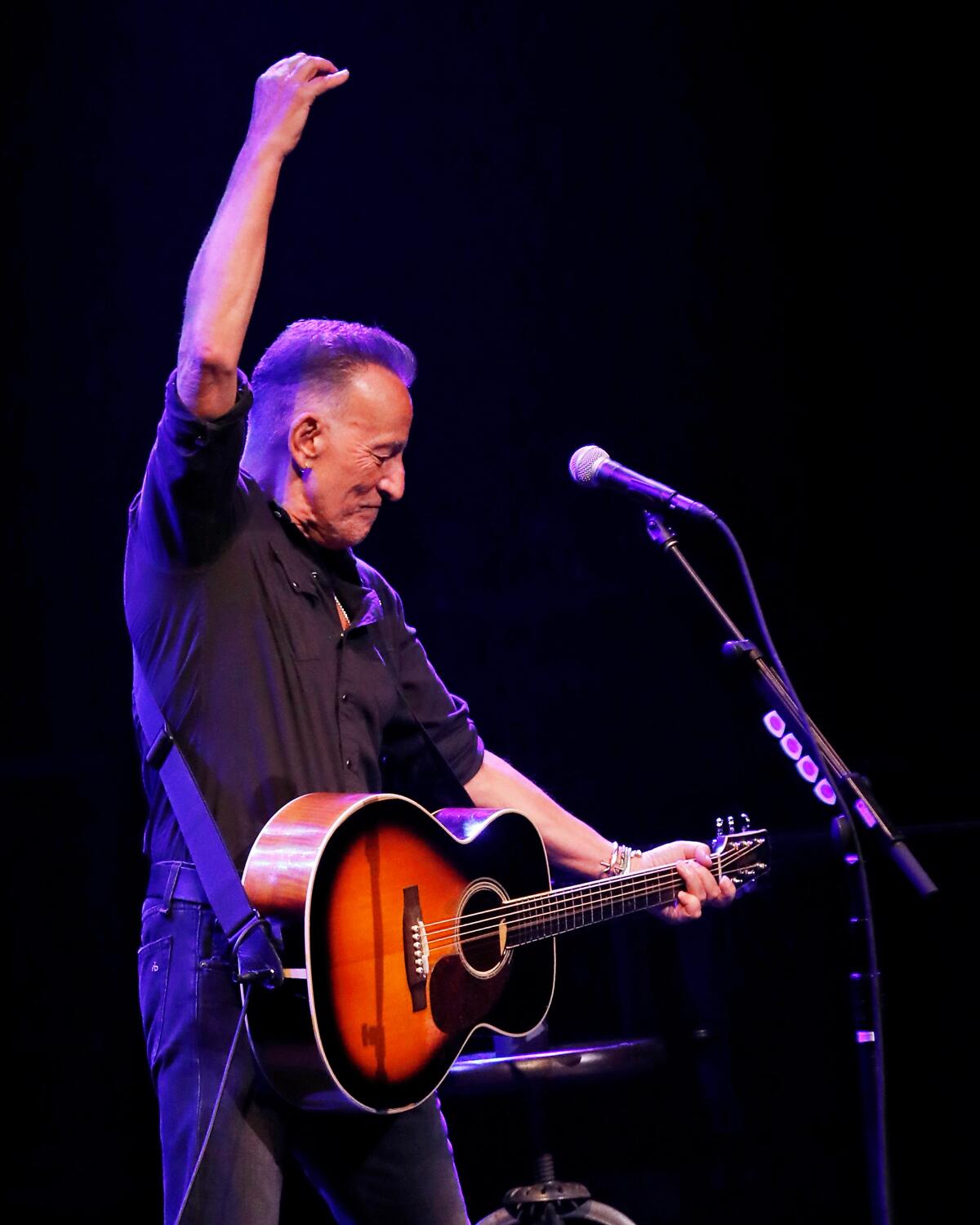
- Share via
As one of the most beloved figures in popular music, Bruce Springsteen has enjoyed decades of absolute devotion from his legion of fans. A national tour with his E Street Band typically means his hardcore followers bounce from state to state, taking in as many of the Boss’ legendary three- or four-hour marathon concerts as their wallets will allow.
Next year might be different. When Springsteen’s loyal fan base logged in on July 20 to purchase tickets for the opening seven dates of his 2023 U.S. arena tour, Ticketmaster’s “dynamic pricing” program sent the face value for some floor seats to a dizzying $4,000 to $5,000 apiece. In an attempt to cut off the multibillion-dollar resale business, ticket prices jumped to a “fair value” based on demand to approximate the secondary market. Rather than scalpers, the money would instead go to the artist and promoter.
That has meant fans looking to buy a coveted seat near the stage found themselves on a financial ride as bumpy as the latest cryptocurrency. Prospective concertgoers also complained that the final checkout cost could be much higher than that price originally offered, as processing and other Ticketmaster fees would also be exponentially greater.
Another round of tickets goes on sale Friday morning for seats on the 31-date U.S. tour, which begins Feb. 1 in Tampa, Fla. No Los Angeles shows have been announced.
Twitter can’t agree on whether Bruce Springsteen sings ‘waves’ or ‘sways’ on his 1975 classic, ‘Thunder Road.’ Turns out, Springsteen isn’t sure either.
It isn’t the first time Springsteen ticket prices have got fans upset, but for the first time, much of the anger is directed at the Boss himself. Many fans lamented that Springsteen tickets were becoming a luxury item, where only the most affluent fans would be singing along to “The River” and other working-class anthems.
Even Backstreets magazine, the most devoted chronicler of Springsteen’s career for decades, posted a screenshot on Twitter of sky-high prices from Ticketmaster’s “Official Platinum” seating program and asked in disbelief: “Tampa mid-floor for $4,400 each, anyone?”
The outrage drew the attention of U.S. Rep. Bill Pascrell Jr. of New Jersey, who aimed his disapproval squarely at Ticketmaster for “the latest scandal from the greedy ticket monopoly.” Pascrell, who opposed Ticketmaster’s 2009 merger with Live Nation, is also a sponsor of the BOSS Act, which would force some transparency on the ticket industry. In a statement, he added, “Americans have the right to enjoy some live entertainment without getting ripped off.”
Springsteen hasn’t commented, and manager Jon Landau declined an interview request through a publicist. That initial silence from the Springsteen camp led some to confront E Street Band members online. Guitarist Steve Van Zandt responded: “I have nothing whatsoever to do with the price of tickets. Nothing. Nada. Niente. Bubkis.”
This week, Landau released a brief statement to the New York Times, and was unapologetic, saying the ticket policy came after surveying “what our peers have been doing.”
He also dismissed reports of tickets priced at $1,000 or more as not representative of most sales. “Our true average ticket price has been in the mid-$200 range. I believe that in today’s environment, that is a fair price to see someone universally regarded as among the very greatest artists of his generation.”
A bitter dispute over ownership of Pioneertown roadhouse Pappy & Harriet’s has stirred fears among locals about the gentrification of their community.
Dynamic pricing has already impacted ticket buyers for Harry Styles and Paul McCartney concerts. And some tickets to the Nov. 18 opening of Adele’s rescheduled Las Vegas residency at Caesar’s Palace are currently selling for more than $28,000 on resale websites.
Dynamic pricing is common for sporting events, including Major League Baseball, where the fluctuations can be caused by shifting demand, weather and changing players. But not all professional sports teams are onboard. The Las Vegas Raiders have so far decided against dynamic pricing.
“Dynamic pricing has its pluses and minuses,” says veteran rock promoter Kevin Lyman, founder of the long-running Warped and Mayhem festivals, and now a professor at the USC Thornton School of Music. “The artist does make more money but when the algorithm kicks in, it seems like there should be some threshold. ... It does make the artist as well as Live Nation look pretty bad.”
Lyman compares the startling price fluctuations to the costs of flights and hotel rooms when a large convention or festival is announced. “The $200 room shoots up to the $600 room,” he explains, “all based on supply and demand.”
Artist manager Peter Katsis, who has worked with popular acts ranging from the Backstreet Boys to Jane’s Addiction, says an imperfect dynamic pricing process isn’t necessarily solving a problem in a lopsided market. “I don’t find that creating these parameters to hold back scalping really holds back scalping that much,” says Katsis. “We are seeing a weird world out there right now — both in sports and concerts — where there is no real limit to what some people can afford.”
In a statement provided to The Times, Ticketmaster said, “The average price of all tickets sold was $262,” and that just 1.3% of all tickets sold for more than $1,000. But fans dealing with the prices were unmoved.
“In their attempt to replace the scalpers, they’ve become the scalper,” says Pete Maimone, 65, who lives 20 minutes outside of the Bruce foothold of Asbury Park, N.J. When he and other devotees began experiencing the new “dynamic pricing” system, many were stunned by the numbers.
“I’m crying my eyes out. It was disbelief,” he adds, voice cracking. “We just felt so betrayed.”
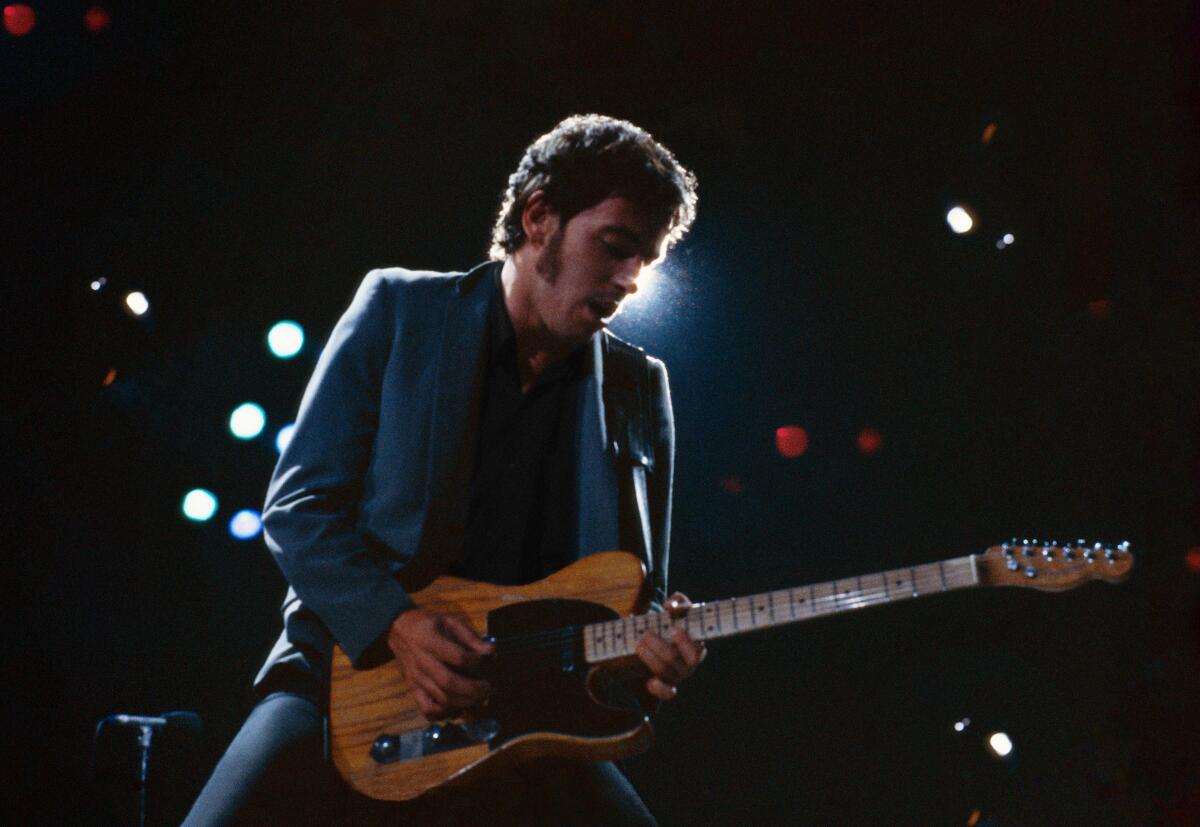
Maimone first saw Springsteen perform in 1972 at Rutgers University. In the years since, he has become a “ticket angel,” helping desperate fans find tickets at face value or sometimes at no charge at all. It’s a tradition carried over from the Grateful Dead’s caravan of followers.
“We’ve helped thousands,” he says. But with the definition of “face value” a wildly fluctuating number, he had to suddenly shut down his private Facebook group. “We don’t know what true face value is.”
Even with their shock and sadness, many of these fans still gush over the impact Springsteen’s live performances have had on them.
“Even at 72, he’s been playing these marathon shows. There’s no better experience than going to a Springsteen show,” says Howie “Chaz” Chazanoff, 53, leader of the 40,000-member Spring-Nut fan group, which raises funds for charity and is known to the Boss.
“I stand with everybody else pretty much,” says Chazanoff of the ticket issue. “It’s been a very disappointing and frustrating time, to say the least.”
“He’s a super positive role model,” says Donna Gray, 52, who runs the Bruce Funds community that finds tickets for fans, with or without funds. Gray doubts that Springsteen or his management had ever tried to purchase tickets through the system, an experience she described as “instant panic and anxiety,” with software glitches and tickets that disappear from the site’s shopping cart before they can be purchased.
“It’s already such a heightened, crazed experience, and to add on that dynamic pricing aspect is just an overload of emotions for many of us,” Gray says.
‘I was ugly-crying most of the time’: Wynonna Judd on being part of Joni Mitchell’s comeback concert
Musicians Wynonna Judd and Blake Mills, and a Newport Folk Festival producer, recount the lead up to, and miracle of, Mitchell’s surprise performance.
The feelings are only heightened from the contrast between the ticket prices and Springsteen’s career-long image as a working-class hero. He’s been an outspoken champion for social justice, celebrated by a diverse population of fans, from radical rocker (and occasional collaborator) Tom Morello to former New Jersey Gov. Chris Christie.
In 1999, in the first of four nights at the just-opened Staples Center (now Crypto.com Arena), Springsteen brought his reunited E Street Band to town and noted the expensive luxury suites. “Too many sky boxes,” he joked from the stage, as Times critic Robert Hilburn wrote. “It’s important for you folks up there [in the suites] ... to come out of your rooms to see a rock show. ... Mix with people.”
In 2002, upset fans were writing letters to the editor complaining about the price of $75 for a Springsteen ticket. In 2015, high prices for Springsteen tickets at Madison Square Garden offered by ticket resellers even before the on-sale date drew the attention of New York State Atty. Gen. Eric Schneiderman.
And beginning in 2017, tickets sold between $75 and $850 for Springsteen’s acclaimed run of shows at the 960-seat capacity Walter Kerr Theatre on Broadway (though scalper resales again reached into the thousands).
“People are in a fury, they’re in a panic,” says Aron Kozin, a fan since 1985 who hosts a YouTube page of found live Springsteen video. He takes a more Zen approach to scoring his seats. “Nobody needs a ticket until February, March or April of next year. I’m sure I’m going to get one — and the longer I wait, the less I’m going to pay.”
He’s argued with other fans online that as bad as it might seem now, the prices will drop, though Kozin admits he’s an outlier among the Springsteen hardcore.
“Everybody who’s mad throws up on their social media a screenshot of the two best seats in the house at $5,000 apiece and screams that they can’t afford to go,” says Kozin. “But that’s not the price to get in the arena. Not everybody can sit in the two best seats in the house.
“Scalping, dynamic pricing, scalper bots are all scapegoats. It’s very simple: It’s really hard to sell 20,000 seats to 90,000 people.”
As angry as many fans are, and with some even planning to back away from Springsteen for now, the controversy is unlikely to cause a permanent rift with his fan base, says Katsis. “It’s difficult to say that there’s a long-term effect for an artist like Bruce Springsteen.”
The days of fans grabbing treasured seats to one of multiple dates at the L.A. Sports Arena after camping out at the Ticketron window are long in the past.
“It would be nice if the everyday fan could get that floor ticket at cost,” says Lyman, “but it is a way different world now.”
More to Read
The biggest entertainment stories
Get our big stories about Hollywood, film, television, music, arts, culture and more right in your inbox as soon as they publish.
You may occasionally receive promotional content from the Los Angeles Times.

